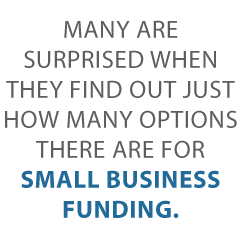- Connect With Us!
- (877) 600-2487
- info@creditsuite.com
Small Business Funding: A Complete Guide to All Your Options
Published By Faith Stewart at March 31st, 2020
When it comes to small business funding, there are way more options than you probably imagine. While not every option is an option for everyone, there is usually some version of each that will work on some level.
Your Definitive Guide to Small Business Funding Options
Most think of loans when they think of small business funding. Term loans, lines-of-credit, invoice financing, and merchant cash advances all have their place. The question is, do you use a traditional lender, look into SBA partners, or veer more toward private lenders?
Also, loans are not the only players in the small business funding game. Other, lesser known players include angel investors, crowdfunding, and grants. You need to know about each one, and your options for each one, to make an informed decision.
Small Business Funding: Types of Loans
There are a number of differ types of loans available. In general, these types of financing can be found with both traditional and private lenders. Typically, if you go the traditional route, small community banks are more small business funding friendly than big banks.
Traditional
These are the standard loans that disperse a set amount of funds, with the borrower repaying over a certain period of time. The payment is the same each month, and they can be either secured or unsecured. Unsecured small business loan options usually have higher interest rates.
Find out why so many companies use our proven methods to get business loans.
Line of Credit
This is revolving debt similar to credit cards. Borrowers are given a maximum limit of the amount of funds they can use, but only pay back the amount that they actually use. For example, a borrower may have a $5,000 line of credit and use $2,000 to buy a new printer. They will only pay back $2,000, until the time comes that they choose to use more. Lines of credit can also be secured or unsecured.
Invoice Factoring
If you have receivables, invoice factoring is an option. The lender buys unpaid invoices from you at a premium, meaning you do not get full value. However, you then have cash in hand for those open invoices. The lender collects from the consumer directly at full value. The older the invoice, the higher the premium.
Merchant Cash Advance
If you accept credit card payments, a merchant cash advance can help you out in a cash pinch. It is basically just what is says. It’s a cash advance on predicted credit card sales. They base the amount of the loan off of average daily credit card sales. Then, payment is taken from future credit card sales. This usually happens electronically. Most often, the process is automatic. The benefits are that you get the funds fast, and there are usually more flexible options for repayment terms depending on your eligibility.
The Small Business Administration
SBA loans are small-business loans guaranteed by the Small Business Administration. Participating lenders, mostly banks, distribute the funds. They can guarantee up to 85% of loans of $150,000 or less, and loans that are more than $150,000 they will guarantee up to 75%. The maximum loan amount they offer is $5 million.
Since they have a government guarantee, financial institutions are able to offer these loans at lower interest rates.
How Do You Qualify SBA Loans?
To be eligible for SBA Government Loans, you must meet certain qualifications. These include:
- Your business must be for profit.
- Your business must be inside the US.
- Business owners must invest equity.
- You must have exhausted all other financing options.
- Your business must qualify as a small business.
- Your business must be in an eligible industry.
What About Repaying SBA Loans?
One perk of SBA government loans is that you can take longer to pay them back than you would otherwise. According to the SBA, the terms depend on how you intend to use the funds.
For example, working capital loans, or funds you intend to use for daily operation, have a repayment terms of seven years. However, funds for new equipment purchase have a term of 10 years. Real estate loan terms extend even longer to 25 years. Of course, the longer the term the lower the interest. As a result, regular payments are lower.
How Do SBA Loans Work?
With little exception, the SBA does not actually provide the funds for the loans they guarantee. The lenders that partner with them provide the funds, but the agency guarantees a portion. Currently, they will guarantee up to $3.75 million.
Find out why so many companies use our proven methods to get business loans.
What does that mean? It means that lenders are able to offer better interest rates and terms than they would otherwise be able too. This is because there is a reduced risk with the SBA guarantee. If the borrower defaults on the loan, the Small Business Administration will pay out their guarantee amount.
Find out more about the SBA and the programs they offer here.
Small business Funding: Private Lenders
Private lenders are also known as alternative lenders. Generally, they can be a little more relaxed with requirements. The drawback is that they also tend to have higher interest rates and less favorable terms.
They usually have options for all types of financings at varying rates. There are a ton out there, but here are a few to get you started if you need to go this route for small business funding.
Upstart
Upstart is a fairly new online lender that is using cutting edge technology. They question whether financial information and FICO alone can really determine the risk associated with a specific borrower. Instead, they are using a combination of machine learning and AI to gather alternative data. They then use this data to make credit decisions.
Alternative data includes such things as phone bills, rent, deposits, withdrawals, and even other information less directly tied to finances. Software from the company learns and improves based on this data.
They offer various types of financing products to fit a broad range of needs. From credit card refinancing to student loans, and pretty much anything in-between, there is something for everyone. Debt consolidation and personal loans are included. Business loans are also an option.
You can get a quote on a loan to start or expand a business. Get a quote online in minutes. Learn more in this comprehensive review.
StreetShares started as a service to veterans. Now, they offer term loans, lines of credit, and contract financing. They also offer small business loan investment options. The maximum loan amount is $250,000. Pre-Approval only takes a few minutes. They use a soft pull on your credit so it doesn’t affect your score.
To be eligible, you must be in business for at least 12 months with annual revenue of $25,000. Exceptions are possible also. Loans to companies in business for at least 6 months that have higher earnings can get approval on a case by case basis. The borrower’s credit score must be at least 620. For more on StreetShares, see our in-depth review.
Kabbage
Kabbage is a well know online lender. They offer a small business line of credit that can help businesses accomplish business goals quickly. The minimum loan amount is $500 and the maximum is $250,000. They require you to be in business for at least one year and have $50,000 or more in annual revenue, or $4,200 or more per month in the previous 3 month period.
They are great if you need cash quickly. Also, their non-traditional approach puts less weight on your credit score, so they may work better for some borrowers than other lenders.
Fundation
Fundation provides both term business loans online and lines of credit. It is most known for its working capital funding options. These are funds meant to help cover the day-to-day costs of running a business rather than larger projects. Typically, these funds come in the form of a line-of-credit.
Find out why so many companies use our proven methods to get business loans.
Their minimum loan amount is $20,000 while the maximum loan amount they offer is $500,000. They require you to be in business for at least 12 months and have annual revenue of at least $100,000. To be eligible, your personal credit score must be no less than 600. Additionally, you must have at least 3 full time employees. That number can include yourself. Business owners cannot live or operate their business in North Dakota, South Dakota, or Nevada.
SmartBiz
If you want the convenience of online lending but need to look toward products offered by the SBA, then SmartBiz is for you.
With the help of the Small Business Administration, SmartBiz offers loans that are government backed. While SBA loans typically take a lot of time and paperwork, SmartBiz found a way to streamline the process. It makes getting loans through the Small Business Administration easier than ever. The minimum loan amount is $30,000 and the maximum is $5,000,000.
As stated, SBA loans are government-backed business term loans for business owners who’ve had difficulty qualifying for other types of financing. As a result, the requirements are a little stricter. Your credit score has to be 650, and you have to be in business for 2 years or more. In addition, annual revenue has to be $50,000 at least, and there can be no outstanding liens, bankruptcies, or foreclosures in the past 3 years.
Small Business Funding: Investors
Of course, the standard investor option is always available. However, often the better option for small business funding is to find an angel investor.
According to Investopedia, angel investors “… invest in small startups or entrepreneurs. Often, angel investors are among an entrepreneur’s family and friends. The capital angel investors provide may be a one-time investment to help the business propel or an ongoing injection of money to support and carry the company through its difficult early stages.”
Most often, they are in it for a one-time contribution. Typically, they do not lend to the same person twice. That is even if that person pays them as agreed.
They like to spread their risk over a lot of people and businesses to make sure they get a good return on their investment. They are also usually a lot more informal than most types of funding. An angel investor can be anyone, from your mom to someone you met through networking.
How to Find Angel Investors
The best way to find these kinds of angel investors is to ask people you know. Likewise, you can try an angel investors website or network. Also, Gust keeps a database of investors, companies, and programs. Startups can search for business plan competitions and other opportunities.
Small business Funding: Crowdfunding
Crowdfunding is an increasingly popular option for small business funding. Many business owners find this is their best option for independence. With crowdfunding, they can start a new business without taking on debt or taking out equity. This is rare startups. However, a little planning and creative marketing can go a long way.
What is Crowdfunding?
Crowdfunding is a type of investment option really. The thing is, you get a lot of smaller investments from a lot of people, a crowd if you will. This is in contrast to getting the bulk of your small business funding from one or two larger investors. The problem is, not everyone with a campaign on a crowdfunding site is successful. In fact, it is kind of rare to get your business fully funded through crowdfunding.
How to Use Crowdfunding to Fund Your Small Business
You’ll have to figure out which crowdfunding platform is best to use for your business. Kickstarter and Indiegogo are two of the most popular.
Trying to get investors will take time. You’ll need the perfect pitch to get investors interested. It helps to learn more about crowdfunding and how to get started.
Small Business Funding: Grants
Another option for funding your small business is grants. They are sometimes overlooked because they tend to be highly competitive. Also, many business owners do not know what’s out there. Take some time to look around and see what’s available.
Many grants are available that are specific to minorities, females, or veterans. There are some grants opportunities that are open to everyone however. One example is the FedEx grant. The FedEx grant is open to any business that has been in operation for at least 6 months and has 99 employees or less. They award eight $7,500 grants, one $15,000 grant, and one $25,000 grant to winners each year. LendingTree is another example. It offers a grant annually of $50,000.
Small Business Funding: The Big Picture
The truth is, there are a lot of options out there that can be used instead of, or in addition to, loans. Don’t forget too, you can always use some version of self-funding. Savings and retirement accounts are sometimes the best options. This is especially true of retirement accounts that offer lending options. Sure, you have to pay the funds back, but you are paying yourself back.
In the end, you’ll have to figure out which option or combination of options will work best for you and your business. This should get you started.

 " class="attachment-blog-single size-blog-single wp-post-image" alt="Get Business Credit Cards for New Businesses Credit Suite-Business Line of Credit Decoded" title="Get Business Credit Cards for New Businesses">>
" class="attachment-blog-single size-blog-single wp-post-image" alt="Get Business Credit Cards for New Businesses Credit Suite-Business Line of Credit Decoded" title="Get Business Credit Cards for New Businesses">>